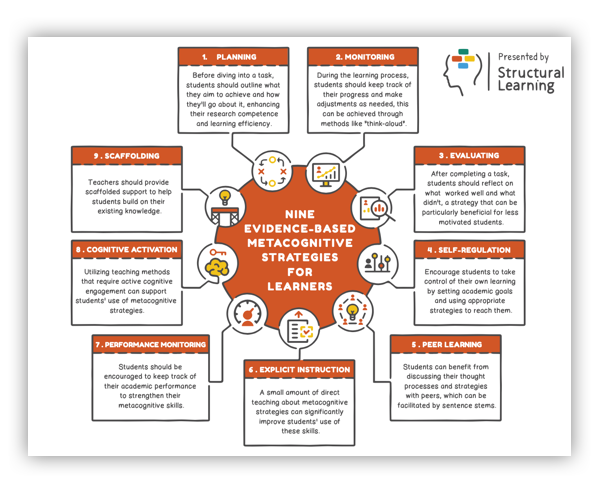A Comprehensive White Paper: Metacognition, Thinking, and Learning
Introduction
Metacognition, the awareness and understanding of one's own thought processes, is a powerful tool for enhancing learning and problem-solving. When combined with effective thinking strategies, metacognition can significantly improve educational outcomes. This white paper delves into the intricate relationship between metacognition, thinking, and learning, drawing insights from renowned research and scholarly works.
Understanding Metacognition
Metacognition, often described as "thinking about thinking," is a multifaceted construct that encompasses both knowledge and regulation of one's cognitive processes.
Metacognitive Knowledge
- Declarative Knowledge: Understanding the nature of cognition, including strategies, techniques, and the factors that influence learning.
- Procedural Knowledge: Knowing how to use specific metacognitive strategies, such as planning, monitoring, and evaluating.
- Conditional Knowledge: Knowing when and why to use specific metacognitive strategies.
Metacognitive Regulation
- Planning: Setting goals, selecting appropriate strategies, and allocating resources.
- Monitoring: Tracking one's progress, identifying areas of difficulty, and adjusting strategies as needed.
- Evaluating: Assessing the effectiveness of one's learning and problem-solving strategies.
Benefits of Metacognition:
- Enhanced Learning: By understanding their own learning styles and strategies, individuals can tailor their approach to maximize effectiveness.
- Improved Problem-Solving: Metacognitive skills allow for more strategic and efficient problem-solving.
- Increased Self-Efficacy: Recognizing one's own strengths and weaknesses fosters a sense of confidence and motivation.
- Better Time Management: Effective metacognitive strategies can help individuals prioritize tasks and allocate time efficiently.
The Role of Thinking in Learning
Thinking is a fundamental cognitive process that underlies all learning. Various thinking skills, such as critical thinking, creative thinking, and analytical thinking, are essential for effective problem-solving and decision-making.
Key Thinking Skills:
- Critical Thinking: The ability to analyze information, evaluate evidence, and form sound judgments.
- Key Components:
- Analysis: Breaking down complex information into smaller parts.
- Evaluation: Assessing the credibility and relevance of information.
- Inference: Drawing conclusions based on evidence.
- Interpretation: Understanding the meaning of information.
- Explanation: Articulating ideas clearly and concisely.
- Key Components:
- Creative Thinking: The ability to generate new ideas and think outside the box.
- Key Components:
- Fluency: Generating a large number of ideas.
- Flexibility: Thinking in diverse ways and considering multiple perspectives.
- Originality: Producing unique and novel ideas.
- Elaboration: Developing and refining ideas.
- Key Components:
- Analytical Thinking: The ability to break down complex problems into smaller, more manageable parts.
- Key Components:
- Problem Identification: Recognizing and defining problems.
- Problem Analysis: Breaking down problems into smaller components.
- Solution Generation: Developing potential solutions.
- Solution Evaluation: Assessing the feasibility and effectiveness of solutions.
- Solution Implementation: Putting solutions into action.
- Key Components:
The Intersection of Metacognition and Thinking
Metacognition and thinking are interconnected in several ways:
- Self-Monitoring: Metacognitive skills allow individuals to monitor their thinking processes and identify areas for improvement.
- Strategic Thinking: Metacognitive awareness enables individuals to select and apply appropriate thinking strategies.
- Self-Regulation: By understanding their own cognitive strengths and weaknesses, individuals can regulate their thinking and learning processes.
Practical Strategies for Enhancing Metacognition and Thinking
- Self-Questioning: Encourage learners to ask themselves questions about their thinking processes.
- Example: "What do I already know about this topic?" "What strategies can I use to solve this problem?" "How can I check my understanding?"
- Mind Mapping: Visualize thoughts and ideas to improve understanding and problem-solving.
- Journaling: Reflect on learning experiences and identify areas for growth.
- Peer Collaboration: Discuss ideas and strategies with others to gain new perspectives.
- Error Analysis: Analyze mistakes to identify underlying misconceptions and improve future performance.
- Metacognitive Instruction: Explicitly teach metacognitive strategies and encourage their use.
Research and Learning: A Synergistic Relationship
Research and learning are inextricably linked. Research provides the foundation for knowledge, while learning enables us to apply that knowledge to solve problems and innovate. By engaging in research, we can deepen our understanding of the world and develop critical thinking skills.
Key Research-Based Learning Strategies:
- Active Learning: Engage learners in hands-on activities and problem-solving.
- Inquiry-Based Learning: Foster curiosity and critical thinking through inquiry-driven projects.
- Collaborative Learning: Encourage peer-to-peer learning and teamwork.
- Technology-Enhanced Learning: Utilize technology to enhance learning experiences.
Conclusion
Metacognition, thinking, and learning are fundamental to human development and success. By cultivating these skills, individuals can unlock their full potential and achieve their goals. By integrating metacognitive strategies and effective thinking techniques into our learning and teaching practices, we can create more engaging, effective, and meaningful learning experiences.
References
Books:
- Metacognition in Learning and Instruction: Theory, Research and Practice by Flavell, J. H., & Wellman, H. M. (Eds.)
- Learning to Think, Thinking to Learn: Developing Metacognition by Art Costa and Bena Kallick
- How to Think Like a Scientist by Richard Feynman
- Thinking, Fast and Slow by Daniel Kahneman
- Make It Stick: The Science of Successful Learning by Peter C. Brown, Henry L. Roediger III, and Mark A. McDaniel1
Research Groups:
- The Metacognition and Learning Centre at the University of Michigan
- The Institute of Educational Sciences (IES)
- The American Psychological Association (APA)
Additional Resources:
- Numerous academic journals, such as Cognitive Science, Educational Psychology, and Metacognition and Learning
- Online databases like JSTOR, Google Scholar, and PubMed



